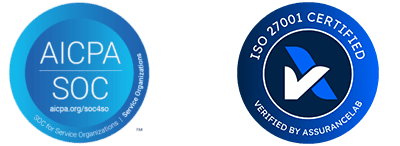How to establish a robust legal document management system for your corporate legal team
In today’s fast-paced corporate environment, the management of legal documents has become a critical aspect of operational efficiency and compliance. The ability to quickly access, manage, and secure relevant documents is not just a convenience but a necessity for legal professionals tasked with protecting their organization’s interests.
Today’s busy legal teams deal with a high volume of documents, contracts, legal files and images which presents significant challenges. Recent studies show that 94% of in house teams manage documents internally which places a significant burden on an already overloaded team.
Implementing legal document management solutions that allow teams to store critical documents safely, effectively manage large volumes of files and find what they need fast is crucial for the effective operation of any modern legal department.
This guide aims to provide a comprehensive overview of establishing robust legal document management systems (legal DMS) for corporate legal teams.
Challenges in Legal Department Document Management
Maintaining version control, organizing a vast array of legal documents, and ensuring the security of sensitive information are just some of the challenges faced by corporate legal teams when it comes to dealing with an ever-growing mountain of documents. Plus, the need for offsite and cloud-based access has become imperative, so legal professionals can work efficiently from anywhere, at any time.
Ineffective Document Administration
Legal teams deal with a vast array of documents, including contracts, briefs, pleadings, and legal research materials. Organizing and categorizing these documents in a way that is intuitive, efficient, and compliant with legal requirements can be challenging without proper document management tools.
Inconsistent Document Lifecycle Management
Legal documents have a lifecycle that includes creation, review, approval, storage, retrieval, and disposal stages. Legal teams need to manage each stage of the document lifecycle efficiently, ensuring that documents are stored securely, accessible when needed, and disposed of in compliance with retention policies and regulatory requirements.
Document Storage Dilemmas
Managing the volume of data effectively while ensuring accessibility, security, and compliance presents a significant challenge. Traditional document storage solutions, such as on-premises servers or network drives, may lack the scalability and flexibility to accommodate the growing volume of legal documents.
Accurate Version Control
Legal documents often undergo multiple revisions by various stakeholders, leading to version control challenges. Ensuring that all team members are working on the latest version of a document and maintaining a clear audit trail of changes to edit documents can be complex without robust version control mechanisms.
Resistance to New Technology
Technology plays a pivotal role in modernizing document management practices. However, legal teams and law firms can often be resistant to change. Other factors such as cost, uncertainty, perceived complexity, security concerns and preference for maintaining paper-based systems can all contribute to resistance to adopting more sophisticated legal document management solutions.
Inadequate Security and Confidentiality
Legal files often contain sensitive and confidential information, including client data, intellectual property, and litigation strategies, making security a top priority. Without adequate safeguards, these documents are vulnerable to unauthorized access, theft, or disclosure.
Protecting important documents against unauthorized access, data breaches, and confidentiality breaches requires robust security measures, including encryption, access controls, and user authentication.
Integration and Functionality: The Backbone of an Effective Legal Document Management System
The integration of document management software into a corporate legal department’s workflow is not just about adopting new software; it’s about transforming how a team operates. This system becomes the central repository for all legal documents, ensuring that every contract, agreement, and legal correspondence is accounted for and easily accessible.
Seamless Integration with Existing Systems
For a legal document management tool to truly enhance productivity, it must seamlessly integrate with the tools and systems already in use by the legal team. This includes email clients like Microsoft Outlook, collaboration tools such as Microsoft Office 365, and even specialized legal software.
The system should also offer other related solutions such as case management, email management and outside counsel management, providing a comprehensive solution that covers all aspects of legal work.
The goal is to create a cohesive ecosystem where documents flow effortlessly between different applications, reducing the need for manual data entry and minimizing the risk of errors.
Robust Functionality
A top-tier legal DMS should offer a suite of robust functionality designed to address the unique needs of legal professionals. Key features of the best legal document management system for your team should ideally include:
- Advanced Document Indexing: Every document should be easily searchable through comprehensive indexing, which includes metadata such as document type, relevant case or matter numbers, and dates.
- Version Control: Legal documents often go through multiple iterations. A robust system provides clear version tracking, ensuring that team members are always working on the latest version while retaining access to previous drafts for reference.
- Secure Access Controls: Given the sensitive nature of legal files, strict access controls are imperative. This means setting permissions based on roles and responsibilities, ensuring that only authorized personnel can view or edit specific documents.
- Cloud-Based Accessibility: With the rise of remote work, cloud-based access is no longer a luxury but a necessity. It allows legal professionals to access documents anytime, anywhere, ensuring that work is not hampered by geographical constraints.
- Unlimited Document Storage: Effectively manage the volume of data, including archival and compliance related documents.
By integrating these functionalities into their daily operations, legal departments can significantly enhance their efficiency, reduce turnaround times, and improve the overall quality of their legal work.
Actionable Strategies for Leveraging Legal Document Management Software
Implementing a new system can be daunting. However, with the right strategies and knowledge management software, legal departments can make the transition smoothly and effectively:
- Conduct a Comprehensive Needs Assessment: Before choosing a new system, understand the specific needs and pain points of your legal department. This includes the types of documents handled, the average volume of paperwork, and any specific compliance requirements.
- Involve Key Stakeholders in the Decision-Making Process: Ensure that the system meets the needs of all team members, from junior lawyers to senior legal counsel. Their input can provide valuable insights into what features and functionalities are most crucial.
- Prioritize Ease of Use and Training: Choose a system that is intuitive and user-friendly. Provide comprehensive training to all team members, ensuring they are comfortable and proficient in using the new system.
- Set Clear Guidelines for Document Management: Establish standardized procedures for naming, storing, and managing documents within the system. This includes setting up a consistent file structure, defining naming conventions, and implementing a regular review and archiving process.
- Regularly Review and Optimize the System: Technology and legal requirements evolve. Regularly review the system’s effectiveness, soliciting feedback from users, and making adjustments as needed to ensure it continues to meet the department’s needs.
By following these strategies, corporate legal teams can ensure the successful implementation and optimization of their legal document management system, leading to improved efficiency, better compliance, and enhanced security of legal documents.
Safeguarding Sensitive Information in Legal Document Management
In corporate legal departments, the protection of sensitive information is paramount. Legal files often contain confidential data that, if compromised, could lead to significant legal, financial, and reputational damage. Implementing stringent data security measures is not just a best practice; it’s a necessity.
Leverage Technology to Enhance Document Security
- Choose software like Dazychain that comes equipped with built-in security features designed to protect sensitive information.
Encryption and Access Controls: The First Line of Defense
- Ensure that all documents are encrypted both at rest and in transit. Encryption acts as a vital barrier, safeguarding data from unauthorized access or interception.
- Implement granular access controls that define who can view, edit, or share documents. Role-based permissions ensure that team members have access only to the information necessary for their roles, minimizing the risk of internal leaks or breaches.
Data Retention Policies: Balancing Accessibility and Compliance
- Establish clear data retention policies that comply with legal and regulatory requirements. Determine how long different types of documents need to be retained and set up automatic archiving or deletion protocols to manage document lifecycles efficiently.
Regular Security Audits and Compliance Checks
- Conduct regular security audits to identify potential vulnerabilities. Additionally, ensure that the system remains compliant with evolving legal standards and regulations, adjusting policies and practices as needed.
Recommendations for Enhancing Legal Document Management
Ensuring a robust legal document management system is an ongoing process, with continuous document organization evaluation, process evolution and adaptation being key to success. For corporate legal teams aiming to elevate their document management practices, the following recommendations serve as a guide toward achieving operational excellence and ensuring legal compliance.
Embrace Continuous Improvement and Innovation
- Stay informed about the latest advancements in legal technology. The legal tech landscape is rapidly evolving, and new solutions can offer unprecedented opportunities for efficiency and security.
Foster a Culture of Security and Compliance
- Make security and compliance fundamental aspects of your legal department’s culture. Regular training sessions and awareness programs can help ensure that every team member understands their role in protecting sensitive information.
Leverage Data for Strategic Decision-Making
- Use the analytics and reporting features to gather insights into your legal operations. This data can inform strategic decisions, helping to optimize processes and allocate resources more effectively.
Prioritize User Adoption and Engagement
- The success of software solutions heavily relies on its adoption by the legal team. Encourage engagement with the system by choosing solutions that are user-friendly and by providing comprehensive training and support.
Collaborate Beyond the Legal Department
- Extend the benefits of your document management system by facilitating collaboration with other departments within your organization. This cross-functional collaboration can enhance the overall efficiency and compliance of the organization.
Leveraging Dazychain for Effective Document Management
By leveraging a comprehensive matter management solution like Dazychain, corporate legal departments can address the challenges of legal document management head-on. Dazychain not only streamlines document-related processes but also significantly enhances security, compliance, and collaboration, empowering legal teams to focus on their core responsibilities without being bogged down by administrative tasks.
Streamlining Document Management with Dazychain
- Dazychain offers an intuitive platform that simplifies the creation, storage, and management of legal documents. Its cloud-based nature ensures that documents are accessible from anywhere, at any time, without compromising security.
Advanced Search Functionality
- Never lose a file again! Use the sophisticated AI-powered document search function for any, exact and all search types for both in-document and document title searches.
Security Features
- Dazychain offers robust encryption, secure access controls, and comprehensive audit trails, ensuring that every document is protected and every action is recorded for accountability.
Seamless Integration and Collaboration
- Dazychain seamlessly integrates with existing tools and systems used by corporate legal teams, including email clients and office suites. This integration facilitates smooth collaboration within the legal department and with external parties, enhancing efficiency and reducing the risk of errors.
Customizable Data Retention and Compliance
- The platform allows legal teams to set custom data retention policies, ensuring compliance with legal and regulatory requirements. Automated archiving and deletion protocols help manage the lifecycle of documents, keeping the system organized and compliant.
Recognizing that no two legal departments are the same, Dazychain offers customizable features to meet the unique requirements of your team. Whether it’s adapting to your specific workflow, integrating with other tools you rely on, or complying with the specific legal industry regulations, Dazychain is flexible enough to accommodate your needs.
Legal Document Management Software: An Essential Tool in a Complex Legal Landscape
Implementing a legal document management solution is crucial for the efficiency, security, and compliance of corporate legal teams.
By following best practices, leveraging advanced technology, and utilizing solutions like Dazychain, legal departments can overcome common challenges and safeguard their sensitive information, ultimately contributing to the success and integrity of the organization.
Adopting tech-led document management is not just a strategic move for any corporate legal team or law firm aiming to maintain a competitive edge and ensure impeccable service delivery.
Dazychain stands as a valuable partner in this journey, offering the tools and features necessary to achieve a streamlined, secure, and effective document management system.
Should you have any questions or wish to explore how Dazychain can specifically benefit your legal department, don’t hesitate to reach out.
Interested in exploring Dazychain’s solutions?
Table Of Contents:
- Challenges in Legal Department Document Management
- Integration and Functionality: The Backbone of an Effective Legal Document Management System
- Actionable Strategies for Leveraging Legal Document Management Software
- Safeguarding Sensitive Information in Legal Document Management
- Recommendations for Enhancing Legal Document Management
- Leveraging Dazychain for Effective Document Management
- Legal Document Management Software: An Essential Tool in a Complex Legal Landscape









